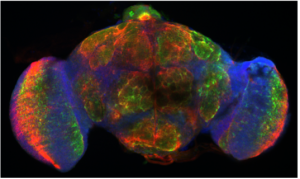PhD position in Molecular Genetics “Impact of Bacteria on Neuronally-Controlled Behaviour in Drosophila” – Royet Lab, IBDM, France, Marseille
Posted by Delphine Dauga, on 15 September 2021
Location: IBDM, Marseille, France
Closing Date: 1 January 2022
Subject
Our body hosts billions of bacteria that colonize our skin our lungs and our gut. The beneficial effect of some of these microorganisms on the development and functioning of these bodies part has been well documented. Recent studies show that by acting on the nervous system, gut bacteria also called microbiota, can also change the behavior of infected individuals (4). However, the underlying cellular and molecular mechanisms remain mostly unknown. The laboratory of Julien Royet uses the Drosophila model to dissect the molecular dialog between the microbiota and the nervous system of the host. We have recently shown that infected flies have an altered behavior and demonstrated that bacterial peptidoglycan is changing the comportment of infected Drosophila by modulating NF-kB signaling in octopaminergic neurons (1,2,5). Using Drosophila genetics, CRISPR-mediated genome editing and latest imaging technologies, the recruited student will perform experiments to understand how bacteria modulates the activity of neurons and how this modulation translates into behavioural changes. Given the remarkable evolutionary conservation in host defense and neuronal mechanisms, we believe that the results obtained should be of significant relevance to an in-depth understanding of bacteria-neurons interactions in organisms other than Drosophila and namely in mammals in which such analyses are difficult to conduct.
Institut : IBDM, Camps de Luminy, Marseille
Team : Host pathogen interaction in the Drosophila model

Expected start: 1st January 2022
Required skills: Good oral English skills as the entire PhD training will be in English, experience in Neurobiology and fly genetics will help but are not mandatory.
Contact: Applicants should send a CV (max 2 pages) a motivation letter (max 1 page) and the email address of two referees to Leo.kurz@univ-amu.fr and Julien.royet@univ-amu.fr.
Recent publications of the host lab :
- Kurz CL, et. al. Peptidoglycan sensing by octopaminergic neurons modulates Drosophila oviposition. Elife. 2017 Mar 7;6. pii: e21937.
- Charroux B, et al. Cytosolic and Secreted Peptidoglycan-Degrading Enzymes in Drosophila Respectively Control Local and Systemic Immune Responses to Microbiota. Cell Host Microbe. 2018 Feb 14;23(2):215-228.e4.
- Masuzzo A, et al, Peptidoglycan-dependent NF-κB activation in a small subset of brain octopaminergic neurons controls female oviposition. Elife. 2019 Oct 29;8:e50559. doi: 10.7554/eLife.50559.
- Masuzzo A, Montanari M, Kurz L, Royet J. How Bacteria Impact Host Nervous System and Behaviors: Lessons from Flies and Worms. Trends Neurosci. 2020 Dec;43(12):998-1010.
- Charroux B, Daian F, Royet J. Drosophila Aversive Behavior toward Erwinia carotovora carotovora Is Mediated by Bitter Neurons and Leukokinin. iScience. 2020 Jun 26;23(6):101152. doi: 10.1016/j.isci.2020.101152.
- Martina M and J Royet. Impact of Microorganisms and Parasites on Neuronally Controlled Drosophila Behaviours Cells 2021, 10(9), 2350; https://doi.org/10.3390/cells10092350
Announcement in pdf
Closing Date: 1 January 2022
Duration: Fixed term

